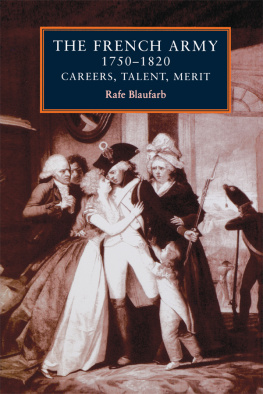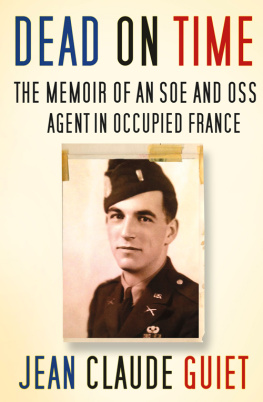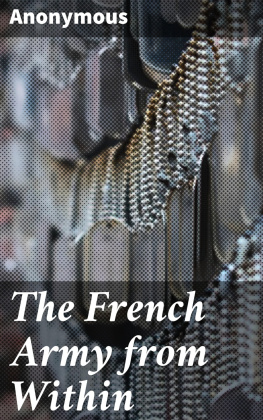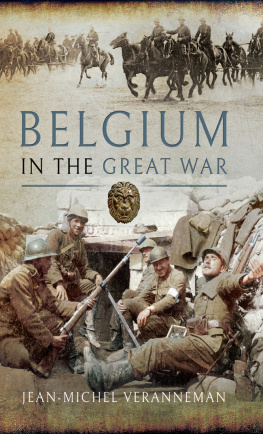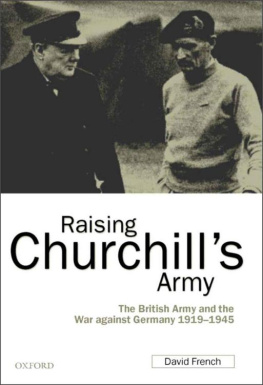ROUTLEDGE LIBRARY EDITIONS: WW2
Volume 11
THE HISTORY OF THE FRENCH FIRST ARMY
THE HISTORY OF THE FRENCH FIRST ARMY
MARSHAL DE LATTRE DE TASSIGNY
This edition first published in 2022
by Routledge
2 Park Square, Milton Park, Abingdon, Oxon OX14 4RN
and by Routledge
605 Third Avenue, New York, NY 10158
Routledge is an imprint of the Taylor & Francis Group, an informa business
First published in 1952 by George Allen & Unwin Ltd
All rights reserved. No part of this book may be reprinted or reproduced or utilised in any form or by any electronic, mechanical, or other means, now known or hereafter invented, including photocopying and recording, or in any information storage or retrieval system, without permission in writing from the publishers.
Trademark notice: Product or corporate names may be trademarks or registered trademarks, and are used only for identification and explanation without intent to infringe.
British Library Cataloguing in Publication Data
A catalogue record for this book is available from the British Library
ISBN: 978-1-03-201217-9 (Set)
ISBN: 978-1-00-319367-8 (Set) (ebk)
ISBN: 978-1-03-210746-2 (Volume 11) (hbk)
ISBN: 978-1-03-210753-0 (Volume 11) (pbk)
ISBN: 978-1-00-321686-5 (Volume 11) (ebk)
DOI: 10.4324/9781003216865
Publishers Note
The publisher has gone to great lengths to ensure the quality of this reprint but points out that some imperfections in the original copies may be apparent.
Disclaimer
The publisher has made every effort to trace copyright holders and would welcome correspondence from those they have been unable to trace.

JEAN DE LATTRE DE TASSIGNY
Marshal of France
THE HISTORY OF THE FRENCH FIRST ARMY
Marshal de Lattre de Tassigny
TRANSLATED BY
MALCOLM BARNES
WITH A PREFACE BY
GENERAL EISENHOWER
AND AN APPRECIATION BY
CAPT. B. H. LIDDELL HART
FIRST PUBLISHED IN 1952
This book is copyright under the Berne Convention. Apart from any fair dealing for the purposes of private study, research, criticism or review, as permitted under the Copyright Act, 1911, no portion may be reproduced by any process without written permission. Enquiry should be made to the publisher.
TRANSLATED FROM
Histoire de la Premire Arme Franaise Plon 1949
PRINTED IN GREAT BRITAIN
in 12 point Fournier type
BY UNWIN BROTHERS LTD
WOKING AND LONDON
To the soldiers of the French First Army who, by their heroism and their blood, have written this history
PREFACE
HERE is the story of the French First Army, the infantry, armour, and mountain troops who carried the Tricolour from its landing in the South of France, north along the Rhone Valley, across the Rhine, and deep into Germany. The Army played an important part in the Allied victory. To my mind, its most brilliant single achievement was the passage of the Vosges, which was accomplished with such speed and skilful manuvre as to deny the enemy any hope of establishing a defence along this strategic barrier.
The commander of that Army and author of this book, General de Lattre de Tassigny, was a brilliant technician and an inspiring leader of men. From the moment of our first meeting in North Africa I was impressed by his ready grasp of fundamentals and his zeal in getting things done. There was never any doubt in my mind concerning his soldierly competence, determination, and loyalty. We formed a warm and lasting friendship.
This book covers only the period of the Second World War, but General de Lattre was, in later years, still to render his country and the Free World extraordinary services, first as Commanding General Land Forces of the Western Union, and subsequently as French High Commissioner and Commander-in-Chief in Indo-China. His untimely death was a hard blow for France and for freedom. Remembering his services and those of his soldiers, a grateful nation conferred upon him in death the highest honour it could pay a soldierthe dignity of Marshal of France.
AN APPRECIATION
by
CAPT. B. H. LIDDELL HART
THE death of General de Lattre has a tragic untimeliness. At 62 he was younger in mind, and more alive to new ideas, than most men are after passing 30. He was outstanding in any company by force of mind and personality, instead of being dependent on the cumulative momentum of rank and position. At a time when technical military conditions have favoured the superior staff officer type of commander, and when the democratic peoples have mistakenly felt safer with ordinariness, Jean de Lattre succeeded in demonstrating the value of innate leadership and staking a claim for genius. He was an aristocrat not merely by heredity but in reality. His rise was a happy phenomenon in an age when the downslope of democratic mediocrity commonly leads to the precipice of demagogic despotism. For he was too highly civilized to pursue dictatorship. In this time of danger the disappearance of such a leader is a great loss not only to France but to Europe.
He was particularly well fitted to tackle our current military problems because of his strong sense of mobility and capacity to make the most of limited means. He had dynamism and creative imagination, the two most essential qualities for supreme command. Few men combine them, and such men rarely reach the top under the present military systemindeed de Lattre was perhaps fortunate in coming up to the higher levels at a time when national disaster had shaken the rule of mediocrity.
Even then he had no easy course. As a reformer he naturally aroused more opposition than he would have done if purely a commander, and his passionate convictions often made him impatient of slower minds or contrary opinions. His sense of drama in history and love of the dramatic touch in leadership prompted him to arouse enthusiasm in public ways that could be, and were, criticized as theatrical and vain by those who were hostile or unresponsive. But in private I never saw the least trace of theatricality, while in numerous confidential talks I was struck by the absence of the signs of vanity which most famous men then reveal, however well they conceal it in public. He was sensitive, certainly, but one of the most sympathetic personalities I have known, and all the more interesting because of his variety of interests.
His freshness of mind was particularly evident in the way he picked young men of promise as his closest assistants, and allowed them to argue with a force and freedom that senior officers would scarcely have ventured. He seemed to enjoy insubordinately inclined subordinates, yet proved capable of preserving their respect. He drove his staff hard, and at times beyond the limits of physical endurance, but that was from intentness on the purpose, and his exacting standardsnot from heartlessness. The strain seemed worth while to them because of the stimulus. I shall always remember the remark of one of them: General de Lattre is a terrible man to servebut I wouldnt care to serve anyone else.






